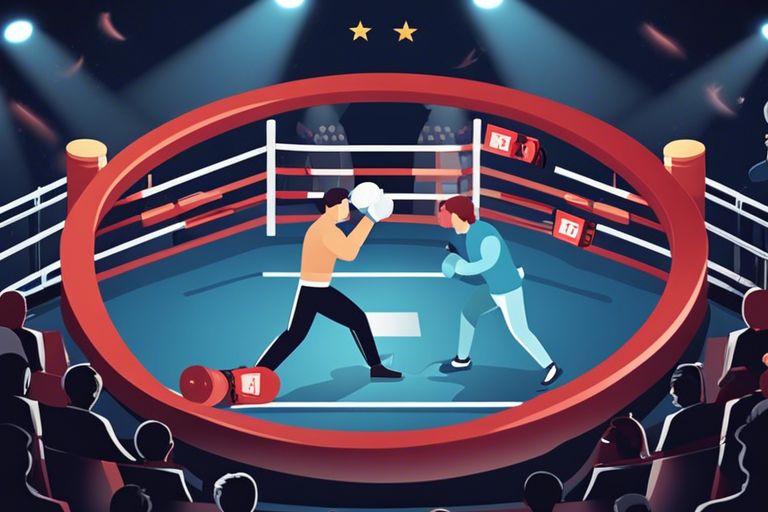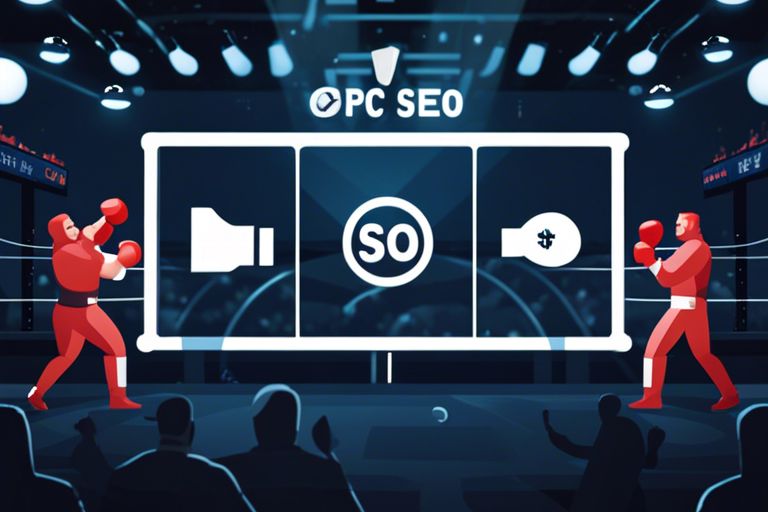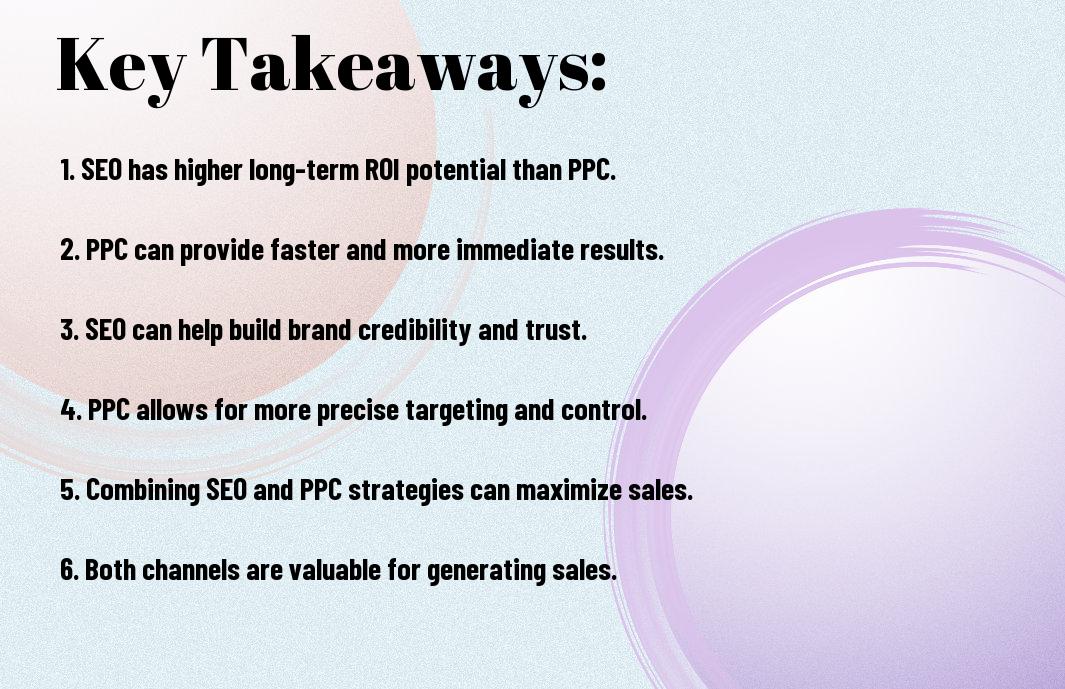Over the years, businesses have debated the merits of SEO versus PPC for driving sales and generating leads. Both channels have their strengths and weaknesses, but ultimately, the decision comes down to which one can deliver the best results for your specific business goals. In this blog post, we will dive deep into the world of SEO and PPC to determine which channel has the potential to generate more sales for your business.
Key Takeaways:
- SEO: Organic search results from SEO efforts can lead to more long-term and sustainable traffic to your website.
- PPC: Pay-per-click advertising can generate immediate results and drive targeted traffic to your site.
- Conversion Rate: While PPC may generate quicker sales, SEO can result in higher conversion rates over time due to trust and credibility built with organic search.
Understanding SEO
Basics of Search Engine Optimization
The foundation of SEO lies in optimizing your website to improve its visibility in search engine results. This involves creating relevant content, using the right keywords, optimizing meta tags, and building quality backlinks. By implementing these strategies, you can improve your website’s ranking on search engine results pages and drive organic traffic to your site.
Long-term Benefits and Challenges
Engine search optimization offers long-term benefits by establishing your website as an authority in your industry and driving continuous organic traffic. However, it also comes with challenges such as algorithm updates, increasing competition, and the time it takes to see results.
With SEO, it’s important to stay updated on search engine algorithms and regularly update your SEO strategies to maintain your rankings. While SEO can take time to show results, the organic traffic it generates is highly valuable and can lead to long-term success for your business.

Understanding PPC
Clearly, Pay-Per-Click (PPC) advertising is a crucial component of digital marketing strategies. It allows businesses to place ads on search engines and various online platforms and pay only when a user clicks on the ad.
Fundamentals of Pay-Per-Click Advertising
For businesses looking to drive immediate traffic to their websites, PPC advertising is a powerful tool. By targeting specific keywords and demographics, businesses can ensure their ads are shown to a relevant audience. Additionally, PPC offers the flexibility to set a budget and adjust it based on the campaign’s performance, making it a cost-effective option for many businesses.
Immediate Impact and Limitations
Limitations of PPC advertising include the potential for high competition on popular keywords, which can drive up the cost per click. Additionally, PPC campaigns require ongoing optimization and management to ensure they are effective and generating a positive return on investment. However, the immediate impact of PPC advertising in driving targeted traffic to a website and generating leads or sales quickly cannot be overlooked.
Advertising through PPC can be a powerful way to reach potential customers and drive sales. However, businesses must carefully monitor and optimize their campaigns to maximize results and avoid overspending on ineffective keywords. With the right strategy and management, PPC can be a valuable tool in a comprehensive digital marketing plan.

Comparative Analysis
| SEO | PPC |
| Long-term investment with sustainable results | Immediate visibility with potential high costs |
Cost Implications and ROI
Comparatively, SEO generally requires a longer timeframe to see significant results, but it can provide a sustainable source of organic traffic over time. On the other hand, PPC offers quick visibility but can come with a high cost per click. When analyzing the cost implications and ROI in the long run, both channels have their unique benefits and challenges.
Effectiveness in Various Industries
With SEO, organic traffic is vital for industries with longer buying cycles and those focused on brand building. In contrast, PPC is effective for industries where immediate results are crucial, such as e-commerce and event marketing. The effectiveness of each channel varies based on industry specifics and the overall marketing strategy in place.
Strategic Integration
Combining SEO and PPC for Maximum Impact
All successful digital marketing campaigns require a strategic integration of SEO and PPC efforts. By combining these two powerful channels, businesses can maximize their online visibility, reach a wider audience, and generate more sales.
Best Practices for a Synergistic Approach
Combining SEO and PPC can yield significant benefits when done correctly. One best practice is to use PPC data to improve keyword targeting in SEO campaigns. Another approach is to use SEO data to identify high-performing keywords for PPC ads. By aligning the strategies of both channels and leveraging the strengths of each, businesses can create a synergistic approach that drives better results across the board.
It is vital to continuously monitor and analyze the performance of both SEO and PPC campaigns to identify areas for improvement and optimization. By testing different strategies and adjusting tactics based on data-driven insights, businesses can ensure a successful integrated approach that maximizes sales and ROI.

To wrap up
Drawing together the comparisons between SEO and PPC, it can be concluded that both channels have their strengths in generating sales. While PPC offers immediate results and control over ad placements, SEO provides long-term benefits and credibility. The effectiveness of each channel in generating sales depends on various factors such as budget, target audience, and business goals. Ultimately, a combination of both SEO and PPC strategies can maximize sales and marketing efforts by driving traffic from different sources. Understanding the unique advantages of each channel and utilizing them strategically can help businesses achieve their sales objectives and improve their online visibility.
FAQ
Q: What is the difference between SEO and PPC?
A: SEO (Search Engine Optimization) is the process of optimizing your website to increase organic (unpaid) traffic from search engine results. PPC (Pay-Per-Click) is a form of online advertising where advertisers pay a fee each time their ad is clicked.
Q: Which channel, SEO or PPC, generates more sales?
A: The effectiveness of SEO and PPC in generating sales can vary based on various factors such as industry, target audience, budget, and campaign strategy. In general, PPC can generate quicker results and immediate sales, while SEO typically provides long-term, sustainable results that can lead to consistent sales over time.
Q: How can businesses decide between investing in SEO or PPC for generating sales?
A: Businesses should consider their goals, budget, timeline, and target audience when deciding between SEO and PPC. If looking for immediate results and have a flexible budget, PPC can be a good option. On the other hand, if aiming for long-term growth and sustainable results, investing in SEO can be beneficial. Some businesses choose to utilize both SEO and PPC to maximize their online presence and sales potential.



